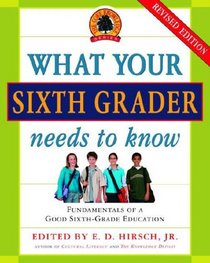Search -
What Your Sixth Grader Needs to Know (Revised)
What Your Sixth Grader Needs to Know - Revised
Author:
What should your child learn in the sixth grade? How can you help him or her at home? This book answers these important questions and more, offering the specific shared knowledge that thousands of parents and teachers across the nation have agreed upon for American sixth graders. Featuring sixteen pages of full-color illustrations, a bolder, eas... more »
Author:
What should your child learn in the sixth grade? How can you help him or her at home? This book answers these important questions and more, offering the specific shared knowledge that thousands of parents and teachers across the nation have agreed upon for American sixth graders. Featuring sixteen pages of full-color illustrations, a bolder, eas... more »
ISBN-13: 9780385337328
ISBN-10: 0385337329
Publication Date: 6/26/2007
Pages: 416
Edition: Revised
Rating: 6
ISBN-10: 0385337329
Publication Date: 6/26/2007
Pages: 416
Edition: Revised
Rating: 6
3.7 stars, based on 6 ratings
Genres:
- Health, Fitness & Dieting >> General
- Nonfiction >> Education >> General
- Nonfiction >> Education >> Homeschooling >> General





